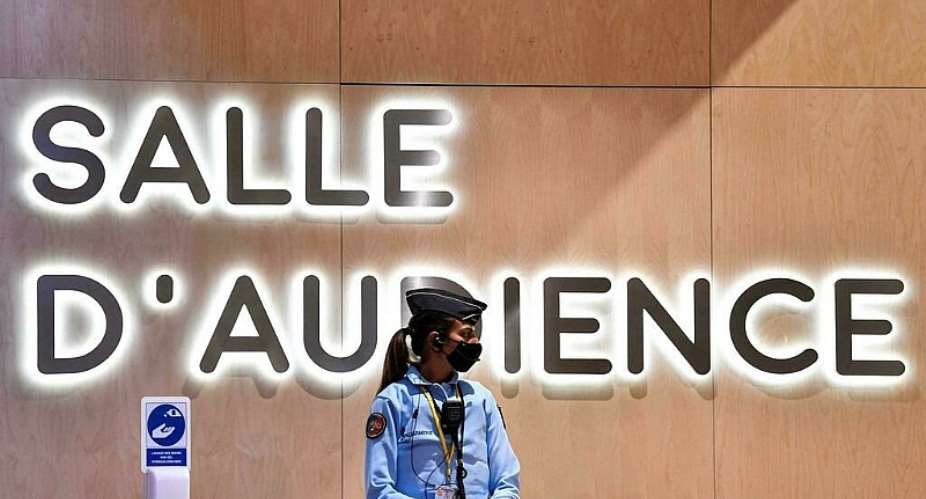A second of the 14 men accused of complicity in the November 2015 terrorist attacks has told the special criminal court that he will no longer make statements or answer questions. "I have already been condemned for something I did not do. I am not well. Whatever I say, it goes against me."
Mohamed Bakkali has already been found guilty in the Thalys affair. He was accused of having driven two terrorists - Ayoub El Khazzani, who opened fire in the high speed train linking Paris and Amsterdam in August 2015, and Abdelhammid Abaaoud, the organiser of a series of murderous attacks planned by Islamic State - across Europe on their way back from Syria.
Mohamed Bakkali has consistently denied any involvement in the Thalys attack, and has appealed against the 25 year prison sentence handed down.
On Wednesday, he was to begin testifying in his defence in the Paris terror case, where he is accused of helping the killers and their accomplices, notably by renting vehicles and an apartment used as a hideout.
At the very start of Wednesday's hearing, Bakkali asked to make a statement.
"I cannot go on," he politely informed the court.
"Whatever I say, it is understood as clever evasion. My words have no value. I no longer know the person I was six years ago.
"I have already been found guilty of something in which I had no part. I fought hard against that. It didn't work. That made me depressed. The evidence I have heard from the families in this trial has finished me off.
"Mr President, this is not a capricious performance, I assure you. I live in total isolation. My survival is at stake. I am not well. It is simply impossible for me to continue."
Respect for right of silence
Tribunal president, Jean-Louis Périès, assured the witness of his absolute right to remain silent, reminding Mohamed Bakkali that his own explanations might help the court to a better understanding of some of the facts in the case, not necessarily to his own disadvantage.
"Take your chances here before us."
A lawyer representing some of the families of the November 2015 victims added his voice to the appeal for cooperation, suggesting that the prisoner's obvious sympathy for the bereaved would be better expressed in words rather than in silence.
"As a man of courage, stand up and speak."
Like his co-accused, Osama Krayem, who has already chosen silence on his own behalf, Mohamed Bakkali refused to utter another syllable.
The trial continued around him.
The court went ahead with questioning anyway, occasionally underlining points on which the accused man's own explanations or clarifications would have been particularly useful.
The silence remained unbroken.
During the Thalys trial, Mohamed Bakkali showed himself to be an intelligent and articulate witness. Much was expected of him in this courtroom.
Instead, we sat through the reading of existing evidence and the ritual posing of questions. It was worse than a waste of time.
Feisty performance
At least there was the accused's brother, Abdelmajid Bakkali. He spoke.
With humour and intelligence, this man, three years older than the accused, described his "little brother" as someone too ready to give a helping hand.
"He is not naive. But he does tend to have confidence in people."
Asked about his brother's religious convictions and possible radicalisation, the witness was clear, determined and critical.
"There are too many '-isms'," he told the court. "Islamism, Salafism, fundamentalism, jihadism. We use the same words but we don't mean the same things.
"For you, someone who practices their religion seriously, who prays five times every day, respects the five pillars of Islam, lives correctly, is a radical . . ."
"Not at all!" interrupted the tribunal president.
"All right. My brother showed no signs of what you would call dangerous radicalisation."
Incomprehensible mosque preacher
Asked about his attendance at a Brussels mosque which has since been closed by the authorities on suspicion of being a source of hate speech, the witness laughed.
"Yes, the preacher was virulent," he admitted.
"You mean he promoted violence?"
"No, I mean he shouted a lot, and waved his arms. But he spoke Arabic. We didn't understand a blessed word he was saying.
"For you, people with beards are suspected of terrorism. A woman wearing the niqab is obviously being forced to cover herself by her husband. It's a French problem. We see Islam from completely different points of view."
Mohamed Bakkali sat through it all in silence. His point of view can only be imagined.
The trial continues.





 Excessive partisanship breeds madness — Prof Gyampo on NPP’s defence of cedi dep...
Excessive partisanship breeds madness — Prof Gyampo on NPP’s defence of cedi dep...
 PDS scandal: ‘The totality of Ghana’s loss is the ‘dumor’ being experienced toda...
PDS scandal: ‘The totality of Ghana’s loss is the ‘dumor’ being experienced toda...
 677,140 births and 50,992 deaths recorded in 2022 - Statistical Report
677,140 births and 50,992 deaths recorded in 2022 - Statistical Report
 Prince Harry, Meghan visit Nigeria
Prince Harry, Meghan visit Nigeria
 Ghana’s electoral commission is one that trusts thieves — Omane Boamah
Ghana’s electoral commission is one that trusts thieves — Omane Boamah
 Mahama is the embodiment of corruption; he can’t advise NPP gov’t on corruption ...
Mahama is the embodiment of corruption; he can’t advise NPP gov’t on corruption ...
 All government cares about is spending more and more money on itself — Dalex Fin...
All government cares about is spending more and more money on itself — Dalex Fin...
 COVID-19: GHS records 57% vaccination coverage
COVID-19: GHS records 57% vaccination coverage
 My government will support churches – Bawumia assures Clergy
My government will support churches – Bawumia assures Clergy
 Don't be 'conduit' to President Akufo-Addo's 'I can't hand over power to Mahama'...
Don't be 'conduit' to President Akufo-Addo's 'I can't hand over power to Mahama'...
